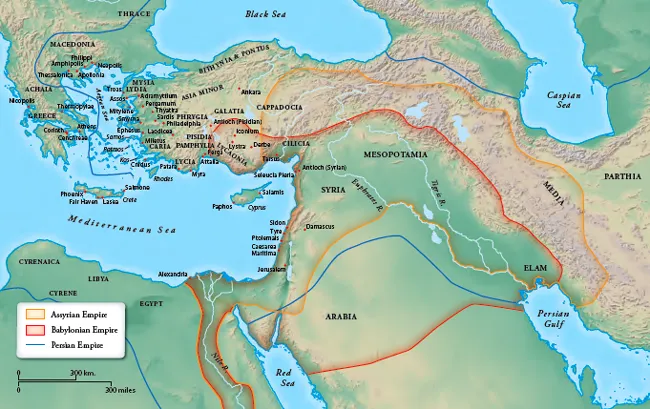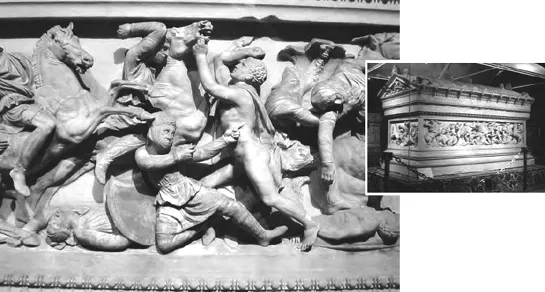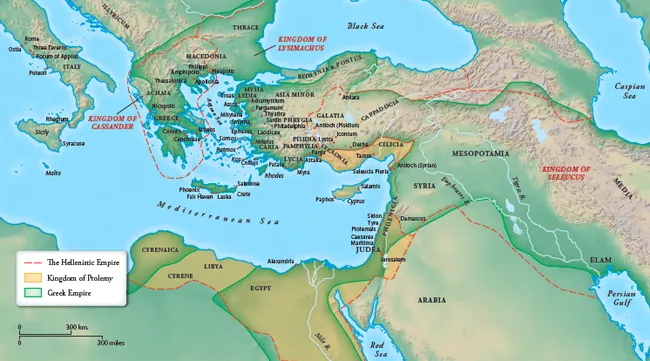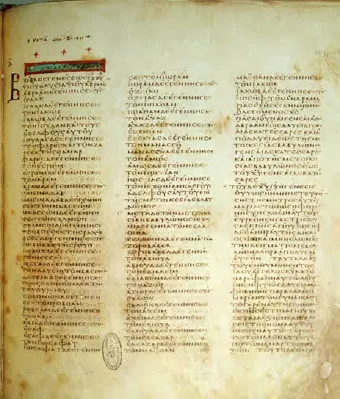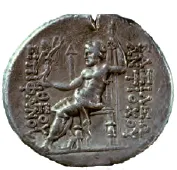The Greek Period and Preliminaries
From the Old Testament to Alexander the Great
In Old Testament times the kings Saul, David, and Solomon ruled over all twelve tribes of Israel. Then the nation split into the ten-tribed northern kingdom of Israel and the southern kingdom of Judah, with the tribe of Benjamin absorbed into the tribe of Judah. The Assyrians conquered the northern kingdom and took most of its inhabitants as exiles into Assyria. Next, the Babylonians took control of the Middle East from the Assyrians, conquered the southern kingdom of Judah, and took most of its inhabitants as exiles into Babylonia. The Persians then took control from the Babylonians and let exiled peoples, including Jews, return to their native lands if they so wished. Some did. Others did not. Under the Persians there began the intertestamental period, sometimes called “the four hundred silent years” because of a gap in the biblical record (though nonbiblical records have survived). During this gap Alexander the Great came from Greece-Macedonia and conquered the Middle East by inflicting successive defeats on the Persians at the battles of Granicus (334 B.C.), ISSUS (333 B.C.), and Arbela (331 B.C.).
Hellenization
The Greek culture, called
Hellenism , had been spreading for some time through Greek trade and colonization, but Alexander’s conquests provided far greater impetus than before. The
Greek language became the
lingua franca, or common trade and diplomatic language. By New Testament times Greek had established itself as the street language even
in Rome, where the indigenous proletariat spoke Latin but the great mass of slaves and freedmen spoke Greek, so that Paul wrote his Letter to the Romans in Greek. Alexander founded seventy cities and modeled them after the Greek style. He and his soldiers married oriental women. Thus the Greek and oriental cultures mixed to produce a Hellenistic culture.
Battle scene on the sarcophagus of Alexander the Great
Diadochi
When Alexander died in 323
B.
C. at the age of thirty-three, his leading generals (called
diadochi, Greek for “successors”) divided the empire into four parts. Two of the parts became important for New Testament historical background, the
Ptolemaic and the
Seleucid. The Ptolemaic Empire centered in Egypt. Alexandria was its capital. The series of rulers who governed that empire are called the Ptolemies, after the name of its first ruler, Ptolemy. Cleopatra, who died in 30
B.
C., was the last of the Ptolemaic dynasty. The Seleucid Empire centered in Syria.
Antioch was its capital. A number of its rulers were named
Seleucus, after the first ruler. Several others were named
Antiochus, after the capital city. Together they are called the Seleucids. When the Roman general
Pompey made Syria a Roman province in 64
B.
C., the Seleucid Empire came to an end.
Because it was sandwiched between Egypt and Syria, Palestine became a victim of rivalry between the Ptolemies and the Seleucids, both of whom wanted to collect taxes from its inhabitants and make it a buffer zone against attack from the other. At first the Ptolemies dominated Palestine for 122 years (320-198
B.
C.). Generally, the Jews fared well during this period. Early tradition says that under Ptolemy Philadelphus (285-246
B.
C.) seventy-two Jewish scholars began to translate the Hebrew Old Testament into a Greek version called the
Septuagint. Translation of the
Pentateuch came first. Remaining sections of the Old Testament came later. The work was done in Egypt, apparently for Jews who understood Greek better than Hebrew and, contrary to the tradition, probably by Egyptian rather than Palestinian Jews. For parts of the translation betray a knowledge of Hebrew so poor as to indicate that the translators had less familiarity with Hebrew than with Greek, as would be probable if they lived, not in Palestine, but in Egypt. The Roman numeral
LXX (seventy being the nearest round number to seventy-two) has become the common symbol for this version of the Old Testament.
Portion of the Septuagint in Codex Vaticanus
Coin identifying Antiochus Epiphanes as “God manifest”
“So they built a gymnasium in Jerusalem, according to Gentile custom, and removed the marks of circumcision, and abandoned the holy covenant. They joined with the Gentiles and sold themselves to do evil” (1 Maccabees 1:14-15).
Definitions
intertestamental history = “the four hundred silent years” = the period between the end of Old Testament history and the start of New Testament...
















